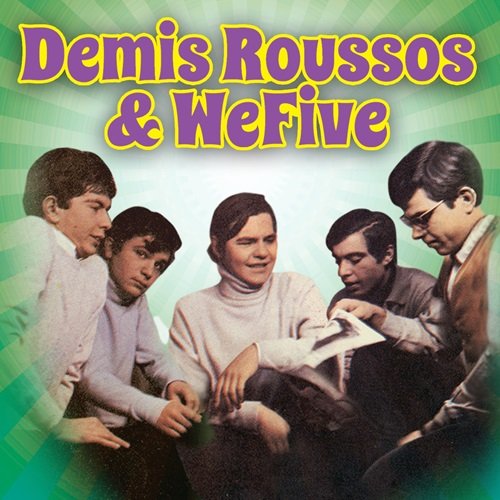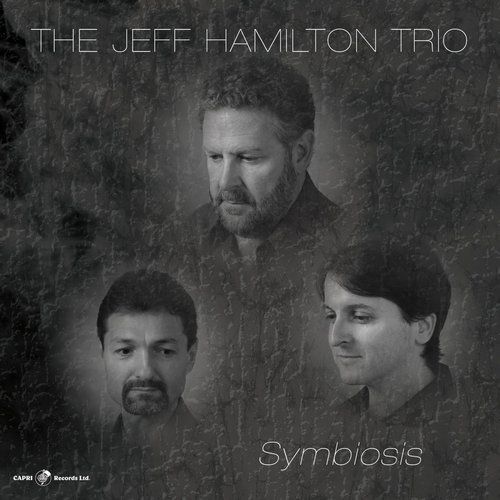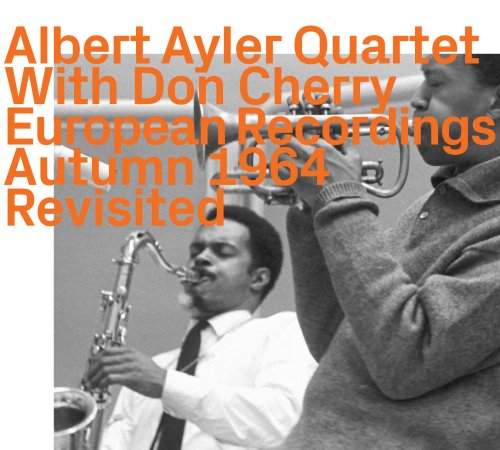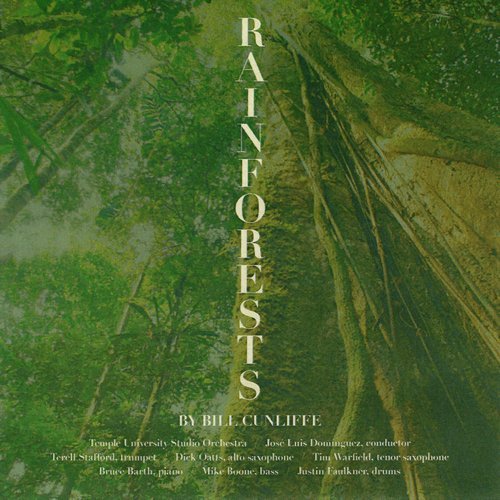Demis Roussos, We Five - Demis Roussos & We Fivee (2021)
- 30 Nov, 15:11
- change text size:
Facebook
Twitter

Artist: Demis Roussos, We Five
Title: Demis Roussos & We Fivee
Year Of Release: 2021
Label: Melody Maker
Genre: Pop, Rock
Quality: Mp3 320 / Flac (tracks)
Total Time: 35:24
Total Size: 88/239 Mb
WebSite: Album Preview
Tracklist:Title: Demis Roussos & We Fivee
Year Of Release: 2021
Label: Melody Maker
Genre: Pop, Rock
Quality: Mp3 320 / Flac (tracks)
Total Time: 35:24
Total Size: 88/239 Mb
WebSite: Album Preview
01. When a Man Loves a Woman 2:41
02. Wild Thing 3:54
03. Black Is Black 4:01
04. Paint in Black 2:34
05. Lady Jane 3:59
06. Summer in the City 2:47
07. Do You Wanna Dance 2:39
08. From Home 3:01
09. Don't Bring Me Down 2:56
10. Paperback Writer 2:19
11. Sunny Afternoon 3:15
12. Percussion Galore 1:19
Demis Roussos:
Singer Demis Roussos, known for his dramatic, operatic vocal stylings, was born Artemios Ventouris Roussos in Alexandria, Egypt, on June 15, 1946, to Greek expatriate parents. In the early '60s, however, the family decided to return to their homeland, and once there, the young Roussos (who had studied trumpet and sung in the church choir in Egypt) began playing in local bands. One of these was Aphrodite's Child, which also featured Vangelis Papatanassiou and Lucas Sideras. A huge hit in Europe, especially France, the band released a handful of albums before breaking up in 1971. With his label contacts in place, however, Roussos was able to secure a deal as a solo recording artist, and later that same year issued the single "We Shall Dance," also included on the album On the Greek Side of My Mind. The 1970s were a prolific time for Roussos, and he released a number of singles and albums that charted highly on the European and Latin American charts. In 1978 the singer decided to retire, and moved to Malibu Beach, where he kept a lower profile. Eventually he moved back to Greece, however, and it was there from which he boarded TWA flight 847 to Rome on June 14, 1985. The plane was hijacked by members of Hezbollah and Islamic Jihad, and Roussos and his wife, along with the other passengers, were held captive for a few days. The experience changed his life, and he decided the best way he could help others and promote understanding in the world was by returning to music. The Story of Demis Roussos came out shortly thereafter, and for a short while the singer's career was reignited, especially in southern Europe. Demis Roussos died in Athens in January 2015; he was 68 years old.
We five:
We Five were a quintet led by singer/guitarist/banjoist Mike Stewart, who also arranged most of the group's music; Pete Fullerton (bass, vocals), Beverly Bivens (lead vocals), Bob Jones (six- and 12-string electric guitars, vocals), and Jerry Burgan (vocals, acoustic guitar) were the other members. They formed in 1964, and were produced by Frank Werber, the Kingston Trio's manager, no surprise since Mike Stewart was the brother of Kingston Trio member John Stewart.
Their original sound, as represented by their first album, stood midway between the music of the New Christy Minstrels and the Byrds. They were as prone to do show tunes as folk numbers, although limited as they were to five members, they didn't have quite the same outsized arrangements on material like "My Favorite Things" (from The Sound of Music), Bernstein and Sondheim's "Tonight" (from West Side Story), and George Gershwin's "I Got Plenty o' Nothin'" (from Porgy and Bess). Stewart also wrote a decent body of originals, and between them the group and Werber had a knack for finding outside songs.
The group's mix of acoustic guitars and high harmonies had a wonderfully radiant, ethereal quality, vaguely similar to the Seekers and anticipating Spanky & Our Gang and the Mamas & the Papas (check out their version of "Cast Your Fate to the Wind"), although they lacked the clearly defined personalities and image of the latter. They also had the good luck to pick up on a song written by Sylvia Fricker, of Ian & Sylvia, from their Northern Journey album, called "You Were on My Mind."
The song, released on A&M Records, became a monster hit during the 1965-1966 folk-rock boom. Bivens, in particular, shone well on this record, with a big voice slightly reminiscent of Judy Henske, and not very much like most of the female folkies of the era. On other songs, she could sound like a young Joan Baez, and elsewhere like Elaine "Spanky" McFarlane. Their version of "You Were on My Mind" was later covered by Crispian St. Peters, an aspiring British singing star, whose own single eventually became a huge hit in England and a lesser one in America.
Unfortunately, the group proved to be barely more than a one-hit wonder, without an adequate follow-up. They charted again in 1966 with "Let's Get Together," but that single only scraped the Top 40 before disappearing, despite being a fair version of the song, similar to the version by the original Jefferson Airplane. Their second album, Make Someone Happy, showed the group trying for a harder, bluesier sound, but producer Werber had far less enthusiasm for the project, and by the time it finally came out, the group had split up.
Mike Stewart organized another version of We Five, and the reconstituted group survived until the end of the 1960s, cutting a new album, Catch the Wind, with covers of the Donovan tune, George Harrison's "Here Comes the Sun," Gordon Lightfoot's "Early Morning Rain," and other contemporary compositions (including a John Stewart song), for Vault. By that time, however, there wasn't much interest in their brand of music.
At various times We Five have reappeared in some version, playing the oldies circuit, with new players substituting for absent originals, but their actual history ended in 1967. Mike Stewart and Bob Jones later formed a short-lived group called West, and Stewart subsequently played with his brother John, and with Kenny Rankin, among others, while Pete Fullerton drifted in and out of the business during the late '60s and early '70s.
Singer Demis Roussos, known for his dramatic, operatic vocal stylings, was born Artemios Ventouris Roussos in Alexandria, Egypt, on June 15, 1946, to Greek expatriate parents. In the early '60s, however, the family decided to return to their homeland, and once there, the young Roussos (who had studied trumpet and sung in the church choir in Egypt) began playing in local bands. One of these was Aphrodite's Child, which also featured Vangelis Papatanassiou and Lucas Sideras. A huge hit in Europe, especially France, the band released a handful of albums before breaking up in 1971. With his label contacts in place, however, Roussos was able to secure a deal as a solo recording artist, and later that same year issued the single "We Shall Dance," also included on the album On the Greek Side of My Mind. The 1970s were a prolific time for Roussos, and he released a number of singles and albums that charted highly on the European and Latin American charts. In 1978 the singer decided to retire, and moved to Malibu Beach, where he kept a lower profile. Eventually he moved back to Greece, however, and it was there from which he boarded TWA flight 847 to Rome on June 14, 1985. The plane was hijacked by members of Hezbollah and Islamic Jihad, and Roussos and his wife, along with the other passengers, were held captive for a few days. The experience changed his life, and he decided the best way he could help others and promote understanding in the world was by returning to music. The Story of Demis Roussos came out shortly thereafter, and for a short while the singer's career was reignited, especially in southern Europe. Demis Roussos died in Athens in January 2015; he was 68 years old.
We five:
We Five were a quintet led by singer/guitarist/banjoist Mike Stewart, who also arranged most of the group's music; Pete Fullerton (bass, vocals), Beverly Bivens (lead vocals), Bob Jones (six- and 12-string electric guitars, vocals), and Jerry Burgan (vocals, acoustic guitar) were the other members. They formed in 1964, and were produced by Frank Werber, the Kingston Trio's manager, no surprise since Mike Stewart was the brother of Kingston Trio member John Stewart.
Their original sound, as represented by their first album, stood midway between the music of the New Christy Minstrels and the Byrds. They were as prone to do show tunes as folk numbers, although limited as they were to five members, they didn't have quite the same outsized arrangements on material like "My Favorite Things" (from The Sound of Music), Bernstein and Sondheim's "Tonight" (from West Side Story), and George Gershwin's "I Got Plenty o' Nothin'" (from Porgy and Bess). Stewart also wrote a decent body of originals, and between them the group and Werber had a knack for finding outside songs.
The group's mix of acoustic guitars and high harmonies had a wonderfully radiant, ethereal quality, vaguely similar to the Seekers and anticipating Spanky & Our Gang and the Mamas & the Papas (check out their version of "Cast Your Fate to the Wind"), although they lacked the clearly defined personalities and image of the latter. They also had the good luck to pick up on a song written by Sylvia Fricker, of Ian & Sylvia, from their Northern Journey album, called "You Were on My Mind."
The song, released on A&M Records, became a monster hit during the 1965-1966 folk-rock boom. Bivens, in particular, shone well on this record, with a big voice slightly reminiscent of Judy Henske, and not very much like most of the female folkies of the era. On other songs, she could sound like a young Joan Baez, and elsewhere like Elaine "Spanky" McFarlane. Their version of "You Were on My Mind" was later covered by Crispian St. Peters, an aspiring British singing star, whose own single eventually became a huge hit in England and a lesser one in America.
Unfortunately, the group proved to be barely more than a one-hit wonder, without an adequate follow-up. They charted again in 1966 with "Let's Get Together," but that single only scraped the Top 40 before disappearing, despite being a fair version of the song, similar to the version by the original Jefferson Airplane. Their second album, Make Someone Happy, showed the group trying for a harder, bluesier sound, but producer Werber had far less enthusiasm for the project, and by the time it finally came out, the group had split up.
Mike Stewart organized another version of We Five, and the reconstituted group survived until the end of the 1960s, cutting a new album, Catch the Wind, with covers of the Donovan tune, George Harrison's "Here Comes the Sun," Gordon Lightfoot's "Early Morning Rain," and other contemporary compositions (including a John Stewart song), for Vault. By that time, however, there wasn't much interest in their brand of music.
At various times We Five have reappeared in some version, playing the oldies circuit, with new players substituting for absent originals, but their actual history ended in 1967. Mike Stewart and Bob Jones later formed a short-lived group called West, and Stewart subsequently played with his brother John, and with Kenny Rankin, among others, while Pete Fullerton drifted in and out of the business during the late '60s and early '70s.









